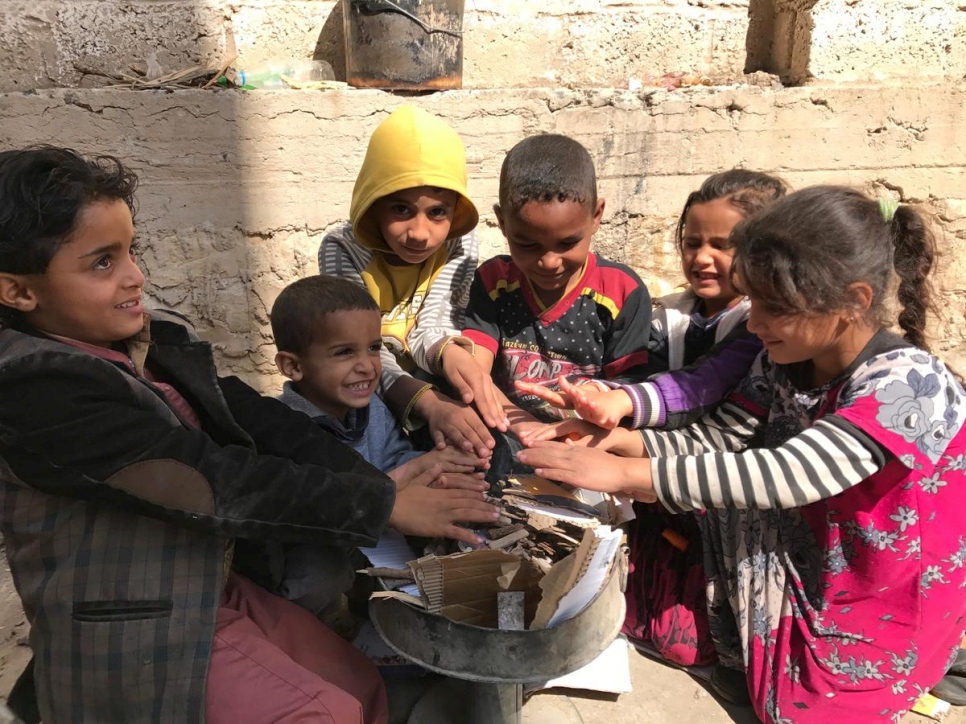Yemenis displaced by fresh violence face bleak winter
ADEN, Yemen – Having endured almost three years of conflict in Yemen’s Red Sea governorate of Al Hudaydah, the Saad* family were finally forced to flee their home after fresh fighting that swept the area in recent weeks destroyed their neighbour’s home and left them in fear of their lives.
The family of five quickly packed their bags and took to the road, dodging bullets, bombs and mines in order to make their escape. Father-of-three Mohammed Saad said they escaped from their home in the coastal district of Al Khawkhah just in time.
“We were lucky we left early – three days later, a bus full of people also trying to escape was hit and several people died,” said former bus driver Mohammed, who now lives with his wife and children in a collective shelter near the southern port city of Aden
The Saad’s are among more than 32,000 people displaced by a surge in violence inside Yemen over the past two months. Hostilities flared up in the capital Sana’a at the start of winter, before fresh clashes erupted in Al Hudaydah which claimed the lives of 113 people in the past fortnight alone, and from where the majority of the newly displaced have fled. Others recently displaced include those from the frontlines further east in Al Shabwah.
“Some of the families that stayed behind are now having to hide underground.”
Single mother Hayat Saif, who escaped Al Khawkah three weeks ago, described the fighting as the worst she had seen during the conflict.
“At some point the intensity increased so much that we just had to leave. We were sleeping under our furniture just to try and protect ourselves. Some of the families that stayed behind are now having to hide underground,” she said.
The latest violence has further exacerbated the world’s worst humanitarian crisis, with more than 22 million people – around three quarters of the total population – in need of humanitarian assistance. More than three million people have been uprooted from their homes since the start of the conflict in March 2015, with only a third so far able to return.
“With hostilities intensifying in Yemen, we’re not only having to respond to new displacement with more and more families continuing to flee, but we’re also having to respond to prolonged displacement. Each day the war extends means another day away from home for those already displaced,” said Ayman Gharaibeh, UNHCR’s Representative in Yemen.
Of the two million Yemenis who remain displaced, almost 90 per cent have been living away from home for more than a year, depleting their resources and those of the local communities that host them as the country teeters on the brink of famine.
The arrival of winter in Yemen, when temperatures can dip below zero degrees Celsius across a number of governorates, has worsened the hardship for many, particularly those displaced and living in informal settlements exposed to the elements with little protection against the cold.
“Our hope is for this ugly war to end and the warring sides to leave us to live in peace.”
Since the beginning of the conflict, UNHCR, the UN Refugee Agency, has been providing emergency assistance and protection services to vulnerable Yemenis on the ground. More than a million displaced men, women and children affected by the conflict have been provided with core relief items such as mattresses, blankets, sleeping mats, kitchen sets and wash buckets.
Within the last month, more than 18,000 displaced Yemeni families (some 130,000 individuals) received UNHCR assistance for winter in the form of a US$200 cash grant, to help meet essential needs.
For Fatemah Murai and her three orphaned granddaughters, who were displaced from Nihm – a district of the capital Sana’a and a flashpoint of the conflict – to the Dharawan informal settlement on the outskirts of the city, UNHCR’s cash assistance will help keep them warmer over winter while they long for a return home.
“We lost our land, home and furniture and became homeless overnight. This is the first time we received assistance since we were displaced. We are facing even more difficulties in winter but now we can buy more blankets, clothes and medicine,” Fatemah said.
“Our hope is for this ugly war to end and the warring sides to leave us to live in peace.”

